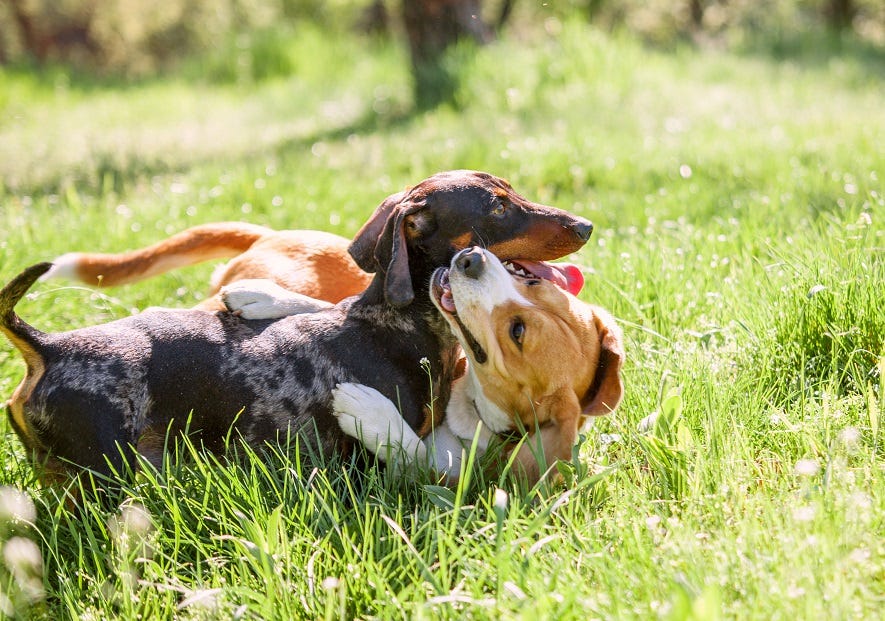Socialisation For Puppies
Your puppy’s early experiences will shape their personality, how they see the world around them and how they deal with stress. A well thought out socialisation plan can help you raise a dog that you can take anywhere with anyone with a happy wag of his tail. Poor socialization can leave you with a fearful, reactive dog that can’t cope with being outside of their home environment.
Give your puppy the best possible start by making sure they have early, safe and POSITIVE experiences with a variety of people, places, surfaces, sounds and situations.
How to socialise your pup
Dog socialisation starts the moment you pick up your furry friend. Every experience they have helps to shape their understanding of the world around them. The socialisation process can even start at home before they are fully vaccinated and ready to venture out into the wider world. From home, you can introduce them to new sounds (especially a noisy vacuum), smells and surfaces like grass and tiles. Between 3-12 weeks is the sweet spot to begin dog socialisation training.
There are a range of different ways you can socialise your pup - it’s best to try different approaches to see which one your pooch responds best to. The main goal of socialising is just to expose them to a range of different people and environments in a controlled setting.
A few tips for socialising include:
- Daily walks. Just taking your pup out in a public place will help them grow more comfortable. Things will start to be a little less scary once they've experienced it!
- Mix it up. Make sure you expose your dog to a wide variety of people to make sure they don't just grow used to that one person.
- Stock up on treats. Have a stash of your pups favourite biscuits or chews and reward them every time they have a successful interaction with another dog.
- Slowly expose them. Don’t throw your pup into the deep end - instead try and expose them to new experiences, sounds or people in a slow and controlled way
- Don’t respond negatively. Instead, try and keep calm, no matter how stressful a situation is. You will only add to your pup's stress by reacting with a sharp voice or tugging of the lead.
- Don't coddle them - if your puppy shows signs of fear or nervousness, the worst thing you can do is console them which they'll take as praise for his undesirable behaviour. When your puppy seems uncertain take them away from the thing that is causing them stress until you have a happy puppy again. Then encourage them to approach at their own rate again, such as having the ‘scary’ person kneel down to the side and not look at the puppy while holding out a treat for them.
- Be aware of the reaction of people and pets around your puppy. Socialisation should be a positive experience for everyone involved! Keep in mind you’re not trying to overwhelm your puppy with new experiences - quantity is not better than quality!
- Enrol in puppy school. Puppy socialisation classes are a great way to help your furry friend meet a range of new characters in a safe and controlled environment.
Puppy socialisation checklist
Your puppy should learn how to interact with a range of new places and people in their normal daily lives. You should try and introduce your pup to:
|
People |
Animals |
Places |
Experiences |
Sounds |
|
Babies and toddlers |
Other dogs of of different size |
Parks/Beaches |
Travelling in the car |
Traffic sounds like car horns |
|
Children of all ages |
Different breeds of dogs |
Doggy day-care Puppy school |
Grooming and bath time |
Crying babies |
|
Adults - both men and women |
Dogs of different ages including senior and puppy |
Sidewalks / streets |
Leash training |
Thunder, lightning and storms |
|
People with glasses, facial hair and hats |
Cats |
Their local vet clinic |
Crate training |
Screaming and laughing |
|
People with mobility aids |
Birds |
Pet store |
Having various parts of their body handled like their teeth, mouth, paws, etc. |
Barking dogs |
|
Runners/joggers |
Other pets like rabbits, guinea pigs |
Other people’s homes |
Swimming |
Loud music |
|
People on motorbikes, bicycles, scooters etc |
Animals they may come across at the park like ducks |
Car parks |
Wearing clothing |
Sudden noises like dropping pans |
|
Large crowds |
Farm animals (if necessary) like horses, cows, sheep and chickens. pigs and rabbits |
Different surfaces like mud, grass, sand |
Different petting - hugging, looming over, patting head. |
Other loud noises like vacuums, fireworks, hair dryer, microwaves |
How to tell if puppy socialisation isn’t going well
Remember, it’s normal for puppies to show some degree of fear when they encounter people and places for the first time. It’s very important that you react in a positive manner.
There are a few key things to look out for during your puppy socialisation to make sure it runs smoothly. Despite how hard they try, our pups can’t exactly tell us how they feel so it’s important to keep a lookout for signs like:
- Body language - cowering, tail tucked under, ears pinned down.
- Constant licking of the lips, yawning or whining.
- Avoiding or running other dogs or people.
- Aggression like nipping, growling or biting.
If you notice any of these signs, it might be best to take a step back and let your pup have a breather before you try again.
Consequences of poor socialisation
If your puppy doesn’t go out into the world, it risks developing a number of behavioural problems later in life, including fear of places, people and animals. Sometimes these dogs may go on to develop aggressive behaviour.
Aggression is often due to anxiety, and dogs that have little or no experience with the outside world may see people, places and other dogs as potential threats. This means they will often react aggressively to protect themselves from the threats that they perceive in their environment. Preventing these sorts of problems is a real responsibility for new owners.
FAQ:
When can puppies meet other dogs?
The best time to socialise puppies is between 6 and 13 weeks of age. It's wise to not let your pup meet other dogs until 2 weeks after their second vaccination.
When can I take my puppy outside?
It’s recommended that you wait two weeks after your puppy’s last vaccination before you introduce them to the wonders of their local park and walking trails.
When should I introduce a puppy to cats?
It’s safe to introduce your pup to a kitten as per your usual socialisation schedule. It’s wise to make this a priority, especially if your cat is going to be sharing the same space as your puppy. Make sure you:
- Supervise all interaction between your puppy and kitten or older cat until you feel comfortable leaving them alone.
- Stop your dog from chasing the cat and make sure the cat can escape easily if need be.
- Make sure your pup is at their calmest. You might want to take them for a walk so they're a little more worn out.
Socialisation Checklist
People
Children under 5
Children 5 – 10
Children 10 – 15
Men
Women
Elderly
Tall
Short
Yelling
Applauding
Wheelchairs
Walkers
Running
Wrestling/playing
Bicycling
Skateboarding
Crowds
Different nationalities
Hats/masks
Surfaces
Grass dry/wet
Concrete
Bark/wood
Grate
Uneven
Plastic
Slippery
Stairs
Slides
Shallow water
Deep water
Tiles
Soft
Sand
Mud
Scales
Animals
Other puppies
Big dogs
Small dogs
Different breeds
Cats
Birds
Rabbits
Sheep
Cows
Horses
Chicken
Playful dogs
Serious dogs
Lizards
Mice
Situations
Checking eyes, ears, paws, tail, teeth
Restraining
Hugging
Looming over
Patting head
Grabbing collar
Nail trims
Brushing
Dark
Windy
Thunder/lightning
Raining
In car
Up on table
Picking up
Taking photo with flash
Rolling onto side/back
Walking with pram
Sounds
Vacuum
Traffic
Hairdryer
Drill tool
Hammering/construction
Crying babies
Thunder/lightning
Screaming/laughing
Adults/children
Barking dogs
Loud music
Dropping pans/sudden noises
Lawn mower
Fireworks
Places
Doggy day-care
Dog park
Playground
Park/oval
Beach
Schools
Friend’s houses
City
Farmers/craft markets
Boarding kennel
Obedience/agility schools
Local sports event




